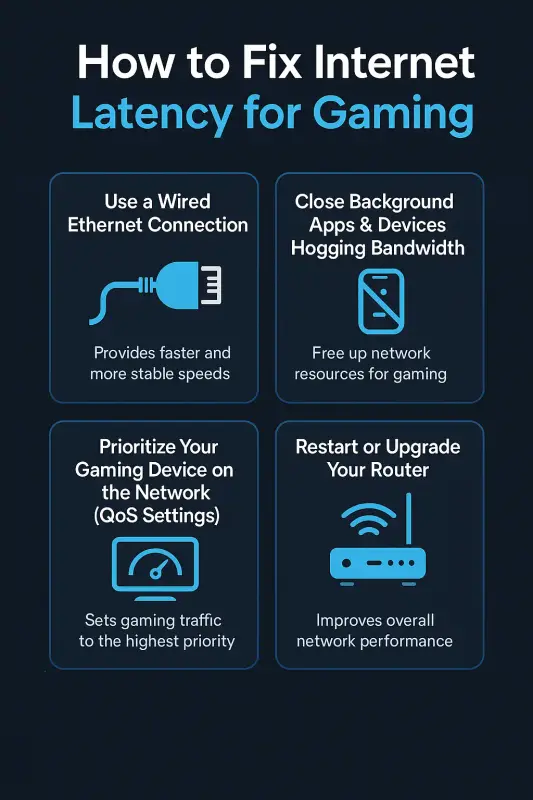15 Powerful Ways to Fix Internet Latency for Gaming – Ultimate Guide 2025

How to Fix Internet Latency for Gaming – Ultimate 2025 Guide
Online gaming thrives on speed, precision, and instant reaction. But nothing ruins the experience more than high latency, commonly referred to as lag. Whether you’re losing ranked matches or getting disconnected mid-battle, understanding how to fix internet latency for gaming is essential for any serious player.
This guide explores every proven method to reduce latency, enhance ping times, and reclaim your edge in fast-paced multiplayer games.
Understanding Internet Latency: What Every Gamer Should Know
What is Latency and Why It Matters
Latency refers to the time it takes for data to travel from your device to the game server and back. It’s measured in milliseconds (ms), and the lower the number, the faster your actions register in the game.
For gamers, latency directly affects:
- Hit detection
- Movement synchronization
- Reaction time
- Overall gameplay smoothness
Difference Between Latency, Ping, and Bandwidth
- Latency (Ping): Measures the delay (in ms) between your input and the game’s response.
- Bandwidth: Refers to the maximum data transfer rate of your internet connection.
- Packet Loss: Happens when data fails to reach its destination, leading to rubber-banding or disconnections.
While bandwidth helps download updates faster, low latency is what truly makes your gameplay snappy and competitive.
How Latency Affects Online Gaming
- In FPS games like Call of Duty or Valorant, even a 20ms delay can put you at a disadvantage.
- In MMOs or MOBAs like League of Legends, latency impacts reaction-based skills and combos.
- Fighting games demand ultra-low latency for precise combos and defense.
Top Causes of High Internet Latency While Gaming
ISP Issues and Throttling
Some ISPs throttle traffic during peak hours or when they detect high usage (like gaming or streaming). This can spike your latency without warning.
Wi-Fi Interference and Router Distance
Wi-Fi is convenient, but walls, distance, and other signals (microwaves, baby monitors, etc.) can interfere. The further your gaming device is from the router, the higher the latency.
Background Applications and Network Congestion
Apps like cloud backups, streaming services, or even someone watching Netflix in the other room can eat up bandwidth and create network congestion.
Step-by-Step Guide: How to Fix Internet Latency for Gaming
Step 1: Use a Wired Ethernet Connection
A wired connection offers faster and more stable speeds than Wi-Fi. Plug your console or PC directly into the router using an Ethernet cable to eliminate signal interference.
Step 2: Close Background Apps & Devices Hogging Bandwidth
- Pause cloud sync apps (Dropbox, OneDrive)
- Shut down auto-updates
- Ask others on your network to limit video calls or streaming while you game
Step 3: Prioritize Your Gaming Device on the Network (QoS Settings)
Enable Quality of Service (QoS) on your router to prioritize gaming traffic over other activities like downloads or video streaming.
Step 4: Restart or Upgrade Your Router
Old routers may struggle with newer games. Restart your router regularly and consider upgrading to a Wi-Fi 6 or gaming-specific router.
Step 5: Use a Gaming VPN or Custom DNS
VPNs like ExitLag or WTFast can optimize routing paths to reduce ping in certain regions. Custom DNS settings (e.g., Google DNS or Cloudflare) can also enhance response time.
Step 6: Choose Game Servers Closest to Your Location
Always pick the nearest server region available in your game settings to reduce travel time for your data.
Step 7: Contact Your ISP for a Gaming-Friendly Package
Ask about:
- Low-latency gaming plans
- Static IP addresses
- Direct peering with game servers
Advanced Fixes for Persistent Latency Issues
Install a Dedicated Gaming Router
Gaming routers are optimized for low-latency traffic and come with:
- MU-MIMO technology
- Advanced QoS settings
- Dual/tri-band frequencies
Configure Port Forwarding for Your Game
Manually forward ports used by your game to reduce latency and improve connectivity. Most game developers list required ports on their support pages.
Use Network Monitoring Tools
Apps like NetLimiter or GlassWire let you monitor bandwidth usage in real time, helping pinpoint latency culprits on your network.
Best Practices to Maintain Low Latency Long-Term
Regularly Update Firmware and Drivers
Ensure your router’s firmware, gaming console, and network adapter drivers are all up to date for peak performance.
Schedule Game Time During Off-Peak Hours
Avoid gaming between 6 PM–10 PM when internet traffic is heaviest. Early mornings or late nights often provide smoother connections.
Monitor Monthly Data Usage and Limits
Some ISPs slow down connections after reaching a data cap. Keep an eye on your usage to avoid throttling.
FAQs: How to Fix Internet Latency for Gaming
What is a good latency for gaming?
Ideally, latency should be under 50ms for competitive gaming. Under 20ms is excellent.
Does a gaming VPN reduce latency?
Yes, in some cases. Gaming VPNs reroute your traffic for faster, more direct paths to game servers.
Can changing DNS improve gaming latency?
Yes, switching to faster DNS (like Cloudflare 1.1.1.1 or Google DNS 8.8.8.8) can shave off a few milliseconds.
How do I check if my ISP is throttling my gaming traffic?
Use tools like SpeedTest.net during different hours. If gaming latency spikes at certain times, throttling could be the cause.
Is Wi-Fi 6 better for gaming latency?
Absolutely. Wi-Fi 6 offers faster speeds, lower latency, and better performance in congested networks.
What games are most affected by high latency?
- First-person shooters (CS:GO, Valorant)
- MOBAs (Dota 2, League of Legends)
- Fighting games (Street Fighter, Tekken)
Conclusion: Lag-Free Gaming is Possible
By following this comprehensive guide, you can finally beat latency at its own game. From wired connections to gaming routers and smart DNS setups, each fix brings you closer to a smoother, frustration-free gaming experience. Whether you’re a casual gamer or an aspiring pro, reducing latency gives you a real edge.